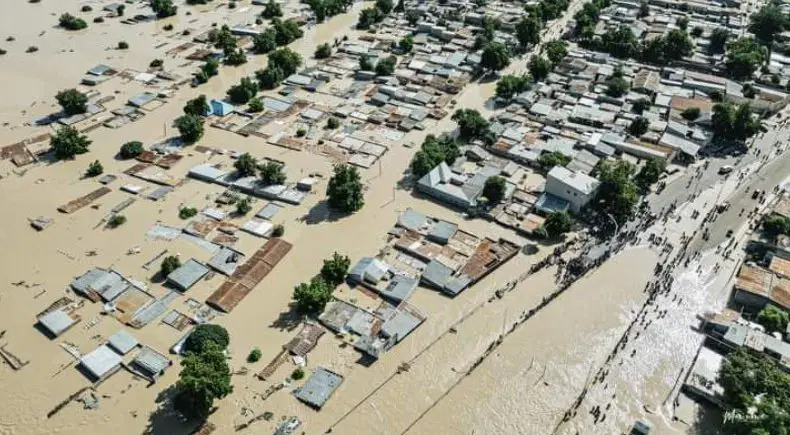By Clifford Ndujihe
Breast cancer is commonly found in women. But it not exclusive to women. Men can get breast cancer too. About one out of every 100 breast cancers diagnosed in the United States is found in a man.
Studies also show that men above 50 years are at risk of breast cancer and therefore need breast cancer screening from time to time.
Men can also have breast cancer – UITH CMD
Chief Medical Director (CMD) of University of Ilorin Teaching Hospital (UITH), Prof. Yusuf Dasilva, confirmed that men can also be affected by breast cancer, and advised both genders to always go for screening.
Dasilva stated this in an interview with newsmen on the sidelines of a ‘Walk for Breast Cancer Awareness’, organised in Ilorin, as part of the activities marking Breast Cancer Awareness Month.
The News Agency of Nigeria (NAN) reports that the programme, with the theme: “No One Should Face Breast Cancer Alone”, was organised by UITH, in collaboration with Medical Women Association of Nigeria (MWAN).
The CMD, who was represented by Prof. Bilyaminu Abayomi, Chairman Medical Advisory Committee (CMAC), UITH, described breast cancer as a disease in which malignant (cancer) cells form in the tissues of the breast.
According to him, certain factors, including increasing age and obesity, increase the risk of breast cancer.
Others, he said, were: harmful use of alcohol, family history of breast cancer, history of radiation exposure, reproductive history (such as age that menstrual periods began and age at first pregnancy), tobacco use and postmenopausal hormone therapy.
The CMD said that the theme of the programme was apt, as it would help to raise awareness and drive behavioural change against stigmatisation of those with the disease.
He stated further that the exercise was to facilitate knowledge sharing and provide a platform for dissemination of breast cancer information and sensitise people on the need to get screened and ensure early diagnosis to save lives.
According to him, breast cancer is not a death sentence, as people can commence treatment, if diagnosed early.
Also speaking, a Consultant General Surgeon at UITH, Dr Olushola Fasiku, underscored the importance of creating awareness on breast cancer.
According to Fasiku, breast cancer is the leading cause of cancer death in women, adding that over two million cases are recorded yearly globally.
To him, there is treatment and people can live, insisting that men too should go for screening.
In her remarks, Dr Mojirola Fasiku, a Consultant Public Health Physician in the Department of Epidemiology and Community Health, UITH, said one in every eight women would have breast cancer.
Fasiku, who noted that breast cancer had been on the rise, called on all stakeholders to support those with the disease.
She warned against stigmatisation, maintaining that the disease was not contagious.
Most common kinds of breast cancer in men
*Invasive ductal carcinoma. The cancer cells begin in the ducts and then grow outside the ducts into other parts of the breast tissue. Invasive cancer cells can also spread, or metastasize, to other parts of the body.
*Ductal carcinoma in situ (DCIS) is a breast disease that may lead to invasive breast cancer. The cancer cells are only in the lining of the ducts, and have not spread to other tissues in the breast.
Symptoms
The most common symptoms of breast cancer in men are:
- A lump or swelling in the breast.
- Redness or flaky skin in the breast.
- Irritation or dimpling of breast skin.
- Nipple discharge.
- Pulling in of the nipple or pain in the nipple area.
- These symptoms can happen with other conditions that are not cancer. If you have any symptoms or changes, see your doctor right away.
Risk factors
Several factors can increase a man’s chance of getting breast cancer.
*Getting older. The risk for breast cancer increases with age. Most breast cancers are found after age 50.
*Genetic mutations. Inherited changes (mutations) in certain genes, such asBRCA1 and BRCA2, increase breast cancer risk.
*Family history of breast cancer. A man’s risk for breast cancer is higher if a close family member has had breast cancer.
*Radiation therapy treatment. Men who had radiation therapy to the chest have a higher risk of getting breast cancer.
*Hormone therapy treatment. Drugs containing estrogen (a hormone that helps develop and maintain female sex characteristics), which were used to treat prostate cancer in the past, increase men’s breast cancer risk.
*Klinefelter syndrome. Klinnefelter syndrome is a rare genetic condition in which a male has an extra X chromosome. This can lead to the body making higher levels of estrogen and lower levels of androgens (hormones that help develop and maintain male sex characteristics).
Certain conditions that affect the testicles can increase breast cancer risk.
*Liver disease. Cirrhosis (scarring) of the liver can lower androgen levels and raise estrogen levels in men, increasing the risk of breast cancer.
*Overweight and obesity. Older men who are overweight or have obesity have a higher risk of getting breast cancer than men at a healthy weight.
How to reduce your risk
If several members of your family have had breast or ovarian cancer, or one of your family members has a known BRCA1 or BRCA2 mutation, share this information with your doctor. Your doctor may refer you for genetic counselling. In men, mutations in the BRCA1 and BRCA2 genes can increase the risk of breast cancer, high-grade prostate cancer, and pancreatic cancer.
If genetic testing shows that you have a BRCA1 or BRCA2 gene mutation, your doctor will explain what you should do to find cancer early, if you get it.




